Cathy Graham of the British Council has reported for us in the past on attempts to bring music back to Afghan children. Her latest communication is particularly salutary:
Dear colleagues and friends,
I’m writing to let you know about the showing of a film by Polly Watkins about Dr Ahmad Sarmast and the Afghanistan National Institute of Music. Many of you will remember the group of students from the school who were in London a year ago, and who performed at the South Bank Centre’s Alchemy Festival, and many of you will already know about the inspirational work of ANIM.
The film is called Dr Ahmad’s Music School, and there will be a free screening in the Kamram Djam Lecture Theatreat SOAS (http://www.soas.ac.uk/visitors/location/), on Monday 16th March, starting at 8.15pm. I enclose a flyer.

The film showing has been partly triggered by a very sad event. On 11th December 2014 Dr Sarmast was seriously injured in a bomb attack on the French Institute in Kabul, where children from the Lycée Français were performing a play, with music provided by some of ANIM’s students. None of the children was physically injured. Dr Sarmast, however, was sitting in front of the suicide bomber. He sustained shrapnel wounds to the head and loss of hearing, though he is making a good recovery and his hearing is returning. In an email of 11th January 2015 he wrote:
In spite of everything, I am more resolved than ever to continue in the important work of making sure music, arts, and culture are available to all Afghan children and youth. It is ever more clear to me the importance of education, and especially music education, in our society to combat extremism and give hope to vulnerable children.
I hope you will be able to join Professor John Baily (Afghanistan Music Unit, Goldsmiths) for this event.
With best wishes
Cathy
Marc Adam will leave Nice in October after the city refused him a contract renewal. The highly experienced director has been there just three years. More from our copains at resmusica.
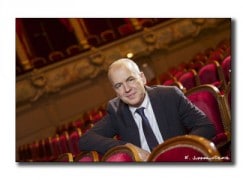
Marc was head of Stadttheater Bern, 2007-11. Before that he ran Lübeck and Rouen.
Brilliant initiative from concertmaster Holly Mulcahy. Read here.
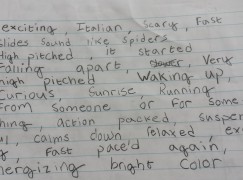
Wire magazine has news of a scheme by which La Scala’s notoriously secretive and clannish backstage becomes an access area for social media, aimed at under-30s. This could breach generations of darkness. Read extract here.
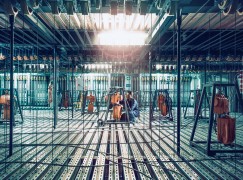
Was this a political decision? Read this statement by the Boston-based Estonian-Armenian composer, Jonas Tarm:
It has been an honor and pleasure to rehearse my music with the New York Youth Symphony and conductor Joshua Gersen. These fellow young musicians are some of the most artistically advanced and mature musicians I have been able to work with.
I am disappointed and confused by the decision of the president of the board and the executive director of the NYYS to cancel my Carnegie Hall debut. This composition, titled “Marsh u Nebuttya” (Ukrainian for “March to Oblivion”), is devoted to the victims who have suffered from cruelty and hatred of war, totalitarianism, polarizing nationalism — in the past and today.
To emphasize that point in musical form, I briefly incorporate historical themes from the Soviet era and from the World War II Germany. The Ukrainian Soviet Socialist Republic (UkSSR) national anthem lasts about 45 seconds and the German Horst Wessel Lied also lasts about 45 seconds in the nine-minute work. This piece was not meant to provoke but to evoke.

This is the program note I provided to the NYYS in September, 2014:
PROGRAM NOTE
Марш y Hебуття [Marsh u Nebuttya]
Dedicated to the victims of hunger and fire
Completed August 1st, 2014.
Between the conception
And the creation
Between the emotion
And the response
Falls the Shadow
—T.S. Eliot
NYYS had no complaints regarding the program note being too short or insufficient until six days before the Carnegie Hall concert.
The NYYS has had the score to “Marsh u Nebuttya” since September. They’ve rehearsed this piece for over three months; and I attended several of those rehearsals. They performed the piece on Feb. 22, 2015 at the United Palace Theater in New York. On March 2nd, just days before its Carnegie Hall performance, the executive director of the NYYS told me that these themes, these instrumental quotes, are potentially offensive. Concerns about the content in this work were never mentioned to me until March 2nd.
The old joke about how do you get to Carnegie Hall – you practice. Apparently you also have to self-censor. I’m disappointed that this work will no longer have the ability to speak for itself.
I’d like to sincerely thank the people who have supported me and asked my work be heard.
— Jonas Tarm
March 4, 2015
And here’s the orchestra’s rapid response:
NYYS Statement on Removal of Commissioned Orchestral Work
The New York Youth Symphony’s decision to remove a commissioned work from Sunday’s performance was not a decision taken lightly. It was a highly unusual step for us—one which was taken thoughtfully, but firmly, as soon as we learned the piece incorporated significant portions of music written by others that we determined were problematic for a student orchestra such as ours to be asked to perform without prior knowledge or discussion.
The first time the composer revealed the source of his music was on March 2, in response to our inquiry. We were told that of the three sources that he used, one is the Horst-Wessel-Lied, the anthem of the Nazi Party from 1930-1945, which is illegal in Germany and Austria. When asked to explain the context and meaning of the piece, which would justify his use of this source, he refused.
This was his obligation to our orchestra as a commissioned artist and particularly important given the fact he was working with students, ages 12-22. Had the composer revealed the sources of his piece and the context under which they were used upon submission of the final commission in September 2014, the piece and the notes could have served as an important teaching moment for our students. However, without this information, and given the lack of transparency and lack of parental consent to engage with this music, we could not continue to feature his work on the program.
Again, if the composer had been forthright with us from the start, this situation would not have transpired. He was chosen last spring for the commission from among a strong group of candidates by an impartial panel of seven composers and music educators. The new piece he created in response to receiving the commission received its first hearing when it was given to the orchestra to rehearse in December.
We believe deeply in a free creative process. But along with freedom comes responsibility, even more so when young people are involved. We continue to be committed to champion new young composers through our ground-breaking First Music composition program, which has commissioned over 137 composers since 1984. We are proud that First Music commission winners have been recognized by the Rome Prize, the Pulitzer Prize, and Guggenheim Fellowship.
Our mission at the NYYS is to educate and inspire young musicians, composers, and conductors. We also encourage creativity within a culture of mutual respect and honesty. This situation, while unfortunate in so many ways, has taught us to remain true to our values as we serve the best interests of all our students.
All of us at the NYYS are deeply disappointed that this decision was necessary knowing how much time and effort the students put into preparing the piece for performance. We thank them for their wonderful contributions to making the NYYS such a special place, and we appreciate the ongoing interest in the success of our performers and the NYYS from all of our alumni, supporters, and the wider music community.
At a time when the future of BBC orchestra is under scrutiny, the following notice has appeared on one of the BBC’s public-engagement websites:
The Orchestra
| BBC Three
Are you a talented classical musician looking for your next big career opportunity?
Do you have the skill, passion, and drive to be part of a groundbreaking new orchestra?
Do you want to shake up stereotypes and help bring classical music to a new generation?
Are you a big personality with something to say on-and-off stage?
We’re developing an exciting new series for BBC Three and we’re looking for performers in the following areas to make up a brand new chamber orchestra:
• Strings
• Brass
• Woodwind
• Percussion
If you are interested or would like to find out more please contact us.
The Orchestra is produced for the BBC by Buccaneer Media.
To apply
Age limit: You must be 18 years of age and over.
Please include your name, current age, what instrument you play and your music qualifications along with why you would like to be considered for the programme.
Email: music@buccaneermedia.com
Closing date: 24 April 2015
The information you provide will be collected and compiled by a third party (as set out in the show information), for the purposes of assessing whether you are a suitable contributor for this show. It might also be used for developing and producing the show and any associated website content, programme, publicity, promotion and/or distribution materials. Please note that the third party may share your details with the BBC if it is necessary for the purposes of the production. They will not store or use your details for any other purpose unless they obtain your consent to do so. For more information about the use of your personal data by a specific production company, please contact them directly. For more information about how the BBC uses your data, please see ourPrivacy and Cookies Policy.
Does the BBC’s right hand know what the left is doing?

The Bournemouth Symphony Orchestra plays in an acoustic hellhole in Poole. It has longed for years to have a hall in the town whose name it bears. Now it seems the conductor Kirill Karabits may have persuaded Bournemouth’s council leader by taking him to hear Bilbao’s 100 million Euro new hall. Bournemouth may beat London to a decent hall. Read here.
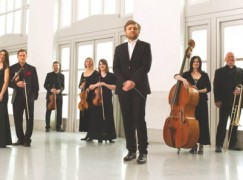
Joel Levine, who founded the Oklahoma City Philharmonic in 1988 and conducted it ever since, will step down in 2018, it was announced today.
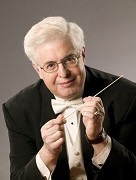
Decca have signed the Borodin Quartet to record the Shostakovich cycle of 15. That’s bold. Thee Borodins have been around with various players for 70 years. Press release follows:
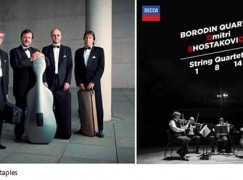
Celebrating a milestone 70th anniversary year, the world-leading Borodin Quartet has signed to Decca Classics for a major series of recordings of the music of Shostakovich.
The centrepiece of this landmark season will be the composer’s complete works for string quartet – starting with the release of String Quartets 1, 8 and 14, plus the Two Pieces for String Quartet (Elegy and Polka) on 23 March.
This album will launch a comprehensive series of recordings that will include Shostakovich’s String Quartets 1–15, the String Quartet Movement in E flat major (“Unfinished Quartet”), the Piano Quintet in G minor, op.57, and Podrugi (“Girlfriends”) for string quartet, trumpet and piano. All the recordings will be made in high-definition 24bit/96kHz.
No quartet performs Russian repertoire better than the authoritative players of the Borodin Quartet – Shostakovich himself personally supervised the ensemble’s study of each of his quartets and a profound understanding of his music has been passed down through the generations.
Decca Classics Managing Director Paul Moseley welcomed the signing:
“The Borodin Quartet is probably the world’s oldest quartet, and though the personnel has inevitably changed, its sound and style remain unique. In 1962 Decca made its first commercial recording in the West and now we are delighted to announce its first complete digital Shostakovich cycle. Thanks to the composer’s personal involvement with the original players, the Borodins’ performances of his work are still unrivalled in both their authority and their intensity.”
Whichever party holds power after the election, the mandarinate of Whitehall has decided that the Department of Culture, Media and Sport ought to be abolished. We happen to agree, although for different reasons.
The DCMS has been a disaster for the arts. Its abolition might bring a restoration of independent thought. Read here.

The implications have started to sink in. In their eagerness to land Simon Rattle before he responded to an American vacancy, the London Symphony Orchestra have awarded him the title of Music Director. He is the first to hold it. All past chiefs of the LSO have been Principal Conductor, with essential powers remaining in players’ hands.
The official list:
Principal Conductor
Hans Richter
Sir Edward Elgar
Arthur Nikisch
Sir Thomas Beecham*
Albert Coates
Willem Mengelberg*
Sir Hamilton Harty
Josef Krips
Pierre Monteux
Istvan Kertesz
Andre Previn
Claudio Abbado
Michael Tilson Thomas
Sir Colin Davis
Valery Gergiev
What’s the difference?
In modern parlance, the music director is responsible for every programme, every guest conductor, every artistic decision. He also has the power to hire and fire players. The LSO players who own the company, have guarded this power fiercely to themselves, firing past chiefs over such differences.
If they have now given Rattle the ultimate say on personnel, they will have surrendered their virtue on the first date and will begin the relationship from a position of disadvantage. This is not the LSO we know. We await the details of the deal, but it’s starting to look as if they have given away a lot in the heat of passion.
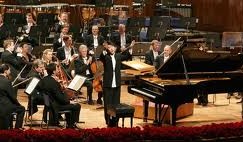
Aldeburgh Music, Benjamin Britten’s legacy, has revealed that it is about to acquire the concert hall and heritage complex the composer caused to be built at Snape Maltings. It is Roger Wright’s first big move since he joined Aldeburgh from the BBC last year. Press release below.
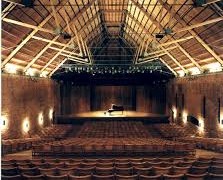
Aldeburgh Music in negotiations to purchase Snape Maltings
The owners of Snape Maltings, the Gooderham family, have announced today that they are in
the final stages of negotiation with Aldeburgh Music for the sale of the site’s freehold and
commercial portfolio. The sale, which is significantly supported by funds from Arts Council
England, is due to be completed on 18 March 2015.
The sale comprises the award-winning Snape Maltings independent retail and residential
properties, including shops, galleries, two cafés, the overall site freehold and further maltings
buildings which have yet to be restored. Aldeburgh Music’s campus currently includes Snape
Maltings Concert Hall, the Hoffmann Building – which houses the Britten Studio – the
Britten–Pears Building and the Dovecote Studio.
The combination of Aldeburgh Music’s world-class, year-round arts programme and the
Gooderhams’ highly successful retail and catering business, monthly farmers’ markets,
exhibitions and the annual Aldeburgh Food & Drink Festival (now one of the UK’s largest food
festivals) has seen Snape Maltings develop into a vibrant cultural village enjoyed by both
Suffolk residents and visitors to the county.
The fortunes of Snape Maltings have been inextricably linked to the Gooderhams and
Aldeburgh Music for nearly five decades, since George Gooderham bought the site in 1965 and
rented the largest building to Benjamin Britten and the Aldeburgh Festival to be converted into
Snape Maltings Concert Hall. The most active period of collaboration has taking place from
2006: since then the Maltings masterplan has seen a further 30% of the site redeveloped,
which has included the opening of Aldeburgh Music’s Hoffmann Building, the House & Garden
shop, Café 1885 and 35 residential properties.
The timing of the sale comes at the culmination of 50 years of ownership by the Gooderhams
and follows the successful delivery of their vision to secure Snape Maltings’ position as one of
Suffolk’s leading and best-loved destinations. Aldeburgh Music’s continued ambition to fulfil
the vision of its founder, Benjamin Britten, by engaging the entire site, will ensure that the
spirit and unity of Snape Maltings is maintained.
Aldeburgh Music’s purchase has been made possible by a combination of re-investing its
endowment, the receipt of an individual donation, and a vital £2m contribution from Arts
Council England’s CDEL allocation. CDEL (Capital Department Expenditure Limit) is part of Arts
Council England’s grant in aid from DCMS and can only be used to buy capital assets, buy
stocks, repay debt or acquire long-term financial assets.
Roger Wright, Chief Executive of Aldeburgh Music, said:
“Without exceptional funding and support from Arts Council England, it would not have been
possible for Aldeburgh Music to take advantage of this remarkable opportunity to protect the
future of the Snape Maltings site. Owning the whole site opens a myriad of possibilities,
crucially the fulfilling of Britten’s vision for a creative campus with a new level of public
engagements. While creating a new source of income for Aldeburgh Music’s artistic
programme, we have every intention of building on Johnny and Alesha Gooderham’s inspired
work to preserve Snape Maltings and develop it as a destination venue. I look forward to an
open discussion about the way in which partnerships can develop the site’s potential for
audiences and the arts in general, and am particularly grateful for the support of the Arts
Council at this significant time in the history of Aldeburgh Music.”
Johnny Gooderham, Managing Director and owner of the Maltings, said:
“I have been fortunate to have been responsible for the Maltings since the age of 24, during
which time the site has seen its most extensive period of development. It is gratifying to see
how Snape Maltings has become such a special place for so many people of all ages and
interests, from the cyclists who visit our teashop to the customers in our shops and galleries
and the walkers who enjoy this unique landscape. This is a most natural unification of two
great assets and it will secure a robust and captivating future for the Maltings.
It is important that the recognition for the achievements to date is shared amongst our staff,
whose dedication and endeavour have been instrumental in making the Maltings the place it is
today.
Aldeburgh Music is now the most natural custodian to take the Maltings forward. By
combining the existing aspects of music, visual arts, food and drink, festivals and heritage, we
have every confidence that Aldeburgh Music will deliver an enriched future for the site.”
Hedley Swain, Area Director for the South East, Arts Council England, said:
“We are pleased to be able to support Aldeburgh Music’s future resilience through the
purchase of Snape Maltings’ retail and residential buildings. It will ensure that Aldeburgh
Music is able to protect the future of the site and continue to deliver great art and culture for
everyone.”
Alan Britten, nephew of Benjamin Britten and President of the Friends of Aldeburgh Music, said:
“If owning Snape Maltings had been even a half a possibility, I feel sure my uncle would have
snapped it up immediately.”












